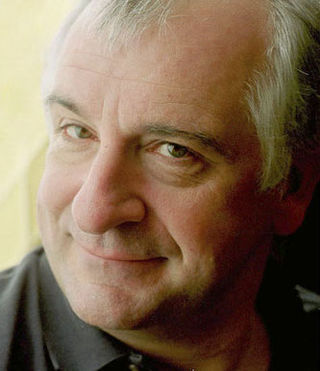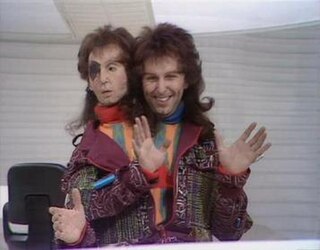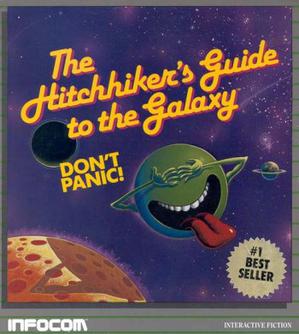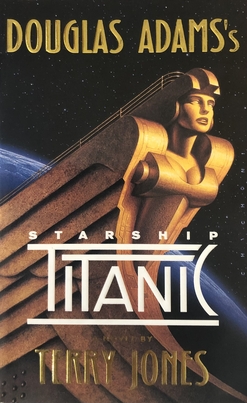See also
- H2g2, a British-based collaborative online encyclopedia project founded by Douglas Adams in 1999
The Hitchhiker's Guide to the Galaxy is a science fiction comedy series created by Douglas Adams.
The Hitchhiker's Guide to the Galaxy may also refer to:

Douglas Noel Adams was an English author, humourist, and screenwriter, best known for The Hitchhiker's Guide to the Galaxy (HHGTTG). Originally a 1978 BBC radio comedy, The Hitchhiker's Guide to the Galaxy developed into a "trilogy" of five books that sold more than 15 million copies in his lifetime. It was further developed into a television series, several stage plays, comics, a video game, and a 2005 feature film. Adams's contribution to UK radio is commemorated in The Radio Academy's Hall of Fame.

The Hitchhiker's Guide to the Galaxy is a comedy science fiction franchise created by Douglas Adams. Originally a 1978 radio comedy broadcast on BBC Radio 4, it was later adapted to other formats, including novels, stage shows, comic books, a 1981 TV series, a 1984 text adventure game, and 2005 feature film.

Mostly Harmless is a 1992 novel by Douglas Adams and the fifth book in the Hitchhiker's Guide to the Galaxy series. It is described on the cover of the first edition as "The fifth book in the increasingly inaccurately named Hitchhikers Trilogy". It was the last Hitchhiker's book written by Adams and his final book released in his lifetime.
Science fiction comedy or comic science fiction is a subgenre of science fiction or science fantasy that exploits the science fiction genre's conventions for comedic effect. Comic science fiction often mocks or satirizes standard science fiction conventions, concepts and tropes – such as alien invasion of Earth, interstellar travel, or futuristic technology. It can also satirize and criticize present-day society.

So Long, and Thanks for All the Fish is the fourth book of the Hitchhiker's Guide to the Galaxy "trilogy of six books" written by Douglas Adams. Its title is the message left by the dolphins when they departed Planet Earth just before it was demolished to make way for a hyperspace bypass, as described in The Hitchhiker's Guide to the Galaxy. A song of the same name was featured in the 2005 film adaptation of The Hitchhiker's Guide to the Galaxy.

Ford Prefect is a fictional character in The Hitchhiker's Guide to the Galaxy by the British author Douglas Adams. His role as Arthur Dent's friend – and rescuer, when the Earth is unexpectedly demolished to make way for a hyperspace bypass at the start of the story – is often expository, as Ford is an experienced galactic hitchhiker and explains that he is actually an alien journalist, a field researcher for the titular Guide itself, and not an out-of-work actor from Guildford as he had claimed.

Zaphod Beeblebrox is a fictional character in the various versions of the comic science fiction series The Hitchhiker's Guide to the Galaxy by Douglas Adams.

Tricia Marie McMillan, also known as Trillian Astra, is a fictional character from Douglas Adams' series The Hitchhiker's Guide to the Galaxy. She is most commonly referred to simply as "Trillian", a modification of her birth name, which she adopted because it sounded more "space-like". According to the movie version, her middle name is Marie. Physically, she is described as "a slim, darkish humanoid, with long waves of black hair, a full mouth, an odd little knob of a nose and ridiculously brown eyes," looking "vaguely Arabic."

The Vogons are a fictional alien race from the planet Vogsphere in The Hitchhiker's Guide to the Galaxy—initially a BBC Radio series by Douglas Adams—who are responsible for the destruction of the Earth, in order to facilitate an intergalactic highway construction project for a hyperspace express route. Vogons are slug-like but vaguely humanoid, are bulkier than humans, and have green skin. Vogons are described as "one of the most unpleasant races in the galaxy—not actually evil, but bad-tempered, bureaucratic, officious and callous", and having "as much sex appeal as a road accident" as well as being the authors of "the third worst poetry in the universe". They are employed as the galactic government's bureaucrats. According to Marvin the Paranoid Android, they are also the worst marksmen in the galaxy. They follow orders as they were told to and will not allow exceptions.

The Hitchhiker's Guide to the Galaxy is an interactive fiction video game based on the comedic science fiction series of the same name. It was designed by series creator Douglas Adams and Infocom's Steve Meretzky, and it was first released in 1984 for the Apple II, Mac, Commodore 64, CP/M, MS-DOS, Amiga, Atari 8-bit computers, and Atari ST. It is Infocom's fourteenth game.

The Hitchhiker's Guide to the Galaxy is the first book in the Hitchhiker's Guide to the Galaxy comedy science fiction "trilogy of five books" by Douglas Adams, with a sixth book written by Eoin Colfer. The novel is an adaptation of the first four parts of Adams's radio series of the same name, centering on the adventures of the only man to survive the destruction of Earth; while roaming outer space, he comes to learn the truth behind Earth's existence. The novel was first published in London on 12 October 1979. It sold 250,000 copies in the first three months.
David Dixon is an English actor and screenwriter. He was born at the Nightingale Maternity Home in Derby, near his father's shop in London Road, and brought up there before the family moved to Normanton in 1959.
The Hitchhiker's Guide to the Galaxy is a comic science fiction series created by Douglas Adams that has become popular among fans of the genre and members of the scientific community. Phrases from it are widely recognised and often used in reference to, but outside the context of, the source material. Many writers on popular science, such as Fred Alan Wolf, Paul Davies, and Michio Kaku, have used quotations in their books to illustrate facts about cosmology or philosophy.

The Hitchhiker's Guide to the Galaxy is a science fiction comedy radio series primarily written by Douglas Adams. It was originally broadcast in the United Kingdom by BBC Radio 4 in 1978, and afterwards the BBC World Service, National Public Radio in the US and CBC Radio in Canada. The series was the first radio comedy programme to be produced in stereo, and was innovative in its use of music and sound effects, winning a number of awards.

The Hitchhiker's Guide to the Galaxy is a BBC television adaptation of Douglas Adams' The Hitchhiker's Guide to the Galaxy which aired between 5 January and 9 February 1981 on BBC2 in the United Kingdom. The adaptation follows the original radio series in 1978 and 1980, the first novel and double LP, in 1979, and the stage shows, in 1979 and 1980, making it the fifth iteration of the guide.
Douglas Adams at the BBC is a three CD set released by BBC Audio in 2004 (ISBN 0-563-49404-2). By using extracts from many radio and TV productions, the three discs cover Douglas Adams's association with BBC Radio and TV from 1974 to 2001, and also include tributes to Adams that were transmitted between 2001 and 2003. Subjects are covered in an A-Z format. Linking narration on all three discs is provided by Simon Jones. Several of the sketches, many of which are included for the first time since their original transmissions, had been discussed in biographies of Adams. In addition, the complete script for "The Lost Hitchhiker Sketch" appears in the 25th anniversary edition of The Hitchhiker's Guide to the Galaxy: The Original Radio Scripts. Disc one covers subjects A to G, disc two covers subjects H to P, and disc three covers subjects Q to Z.

The Hitchhiker's Guide to the Galaxy is a fictional electronic guide book in the multimedia scifi/comedy series of the same name by Douglas Adams. The Guide serves as "the standard repository for all knowledge and wisdom" for many members of the series' galaxy-spanning civilization. Entries from the guidebook are used as comic narration to bridge events and provide background information in every version of the story. The guide is published by "Megadodo Publications", a publishing company on Ursa Minor Beta, and it is written and edited by many characters throughout the series.

Douglas Adams's Starship Titanic is a novel written by Terry Jones, based on the game Starship Titanic conceived by Douglas Adams. The novel was published in October 1997 by Harmony Books and Pan Books, and in November 1998 by Ballantine Books.